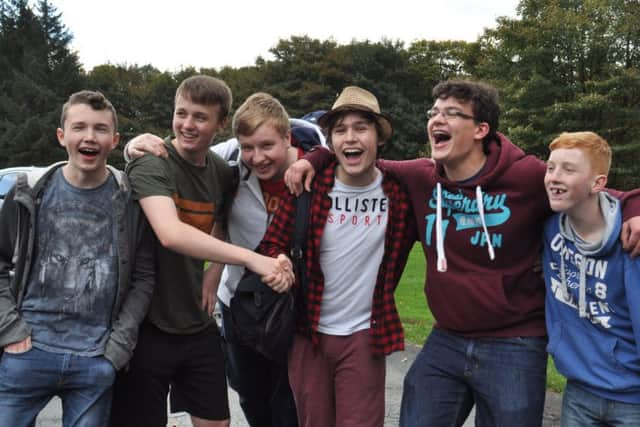Still keeping the faith and spreading the Word


From where the organisation stands now, was there a “golden age” for Scripture Union Scotland?
We do look back to a period in the 1950s, ‘60s and into the ‘70s where some of the foundations were laid for today’s work. There were a group of quite remarkable individuals who established SU Scotland as group to be trusted and which children really enjoyed being part of.
Are young Scots still receptive to your work?
Advertisement
Hide AdAdvertisement
Hide Ad

The answer is a resounding ‘yes’ as we work with schools in line with Curriculum for Excellence and seek to serve schools rather than just fulfil our agenda. We have many more opportunities in and with schools than we can handle – to take assemblies, to run out-of-school-time SU clubs, to bring Bible Alive presentations, to accommodate schools on residential breaks at our centres. Then we still have around 1800 children and young people coming to our camps each year and help run 30 or so missions with churches on an annual basis. So, we feel now is a great timefor the work of SU Scotland!
You operate in over 130 countries worldwide. What is the range of your work?
The work of SU has common features and huge variety. The common threads are a commitment to encourage people of all ages to read the Bible and a passion to make Jesus known to children and young people. In some places, that means working with street children in Peru, child soldiers in the Congo, or children isolated because of their special needs, as in Russia. Sports ministry forms the core of work in SU Canada while in the former communist state of Ukraine there is increasing openness from schools, previously closed to all Christian input, to hear presentations of the true meaning of Christmas and Easter.
Is Scotland still a significant location?


We are still one of the strongest of the 130 SU movements and people from around the globe will often come to visit to see us in action.
Advertisement
Hide AdAdvertisement
Hide AdWe are an older and more stable movement with a role to play in encouraging development worldwide – but we want to keep growing and developing ourselves.
Are there areas that are showing signs of increasing support?
A growing commitment to the disadvantaged is reflected in the work of Junction 12 (J12 includes a drop in but the work is much wider than that) which includes a drop-in located in an old shop and the Ferrywell Project in Edinburgh, but also in the fact that the response to our annual appeal for SU Holiday (camp) sponsorship grew significantly a few years back and in the face of economic uncertainty has remained at that level. This enables many children and young people to enjoy an SU Holiday who could not otherwise afford it. This It reflects the generous-heartedness of our supporters but also the increased focus we have given to reaching out to those who could easily be forgotten.


How has SU had to evolve over the years, given the growth in multi-culturalism?
Advertisement
Hide AdAdvertisement
Hide AdWe hope we are constantly evolving; not changing the essential message about Jesus’ life, death and resurrection but certainly thinking how best to present it in a rapidly changing environment.
Recent years have seen dramatic changes in our communication and culture, how have you kept pace?
We are very aware of changing habits – we are in much more image-based culture where sound-bites rather than sustained argument are to the fore. We try therefore to harness modern technology without diluting what we want to say. But there is also, thankfully, significantly increased awareness of groups who have been more hidden in the past – those with additional support needs (ASN), children disadvantaged through poverty and those from other religious backgrounds. We are trying to make our activities accessible and relevant is reflected in a variety of ways – the asylum seekers enjoying our camps; the children and young people with a parent in prison accessing one of our SU Holidays; the ASN group we have formed to keep us alert to where we can improve things. Multi-culturalism is one of many issues to face. We do so with respect for everyone, with the determination that no child will feel coerced or pressured and being entirely open about the Christian ethos of all we do


Church attendances have dropped, forcing all denominations to re-structure, how has SU fared during this period?
Advertisement
Hide AdAdvertisement
Hide AdAs denominations restructure, there is a concern that they become more inward-looking. This is a challenge to us to really live up to our billing to being there to serve the local church and to help them be engaged in mission with children and young people. We are so grateful for the support we receive from local churches and the positive feedback we get from church leaders on the impact they see in their young people involved with SU. Recently a church leader talked to me about five young people in his church who he baptised. The common factor between the five was that SU had played a major part in coming to faith in Christ. So, this restructuring has not caused major limitations on our work.
Has it become harder to illustrate the relevance of the Gospels to young people?
It has never been an easy task to speak about God to people in our society who think they are doing pretty well without God but surveys illustrate that younger people are interested to know what answers are out there to questions about life and the Christian gospel stands up in that context.
In what are really quite ‘troubled times’ are more families turning to the SU message, and encouraging their children to join?
Advertisement
Hide AdAdvertisement
Hide AdWe have recently re-instated the idea of a family camp but this time we are working in partnership with Bethany Christian Trust which has been hugely beneficial for both organisations and for the families who have attended. These families clearly do feel there is something they as a family need to hear about. In a society in which values need to be established more firmly there is some desire amongst parents that their children learn values that will stand them in good stead for life and look to Christian values as a place to go. Many of the children and young people we attract to our events are encouraged to come by parents or grandparents so we do depend on their willingness to see what we are offering as something positive. Thankfully there are many who do but there is still a great deal of work to be done to help people see that the Christian message is a word of hope in our ‘troubled times’.


Given all the other attractions, and distractions, how do you compete for people’s time?
It’s a challenge, particularly in a culture where technology tends to rule people’s lives. But ‘kids’ still enjoy being ‘kids’. They discover that they can adapt to not being tied to their phones every waking hour when they are at camp – so they enjoy the games, the outdoors, the banter. They find deep and lasting friendships through our activities that (admittedly deepened through Facebook and Instagram etc) mean something to them. These things are attractive to them and they will come back for these.
One of the foundations of your ongoing strategy is ‘boldness’. What does SU mean by that?
Advertisement
Hide AdAdvertisement
Hide AdIt means a lot of things. One is building confidence in young people to be open about their faith and what the Bible says. Too often the culture has made young Christians reticent to speak about following Jesus. Another is being willing to speak up for the spiritual needs of children and young people who can easily be marginalised. It also means boldly sharing our vision and calling others to partner with us in prayer, financial support and volunteering. We might even be bold enough to ask people reading this to consider joining with us in carrying forward the vision from here!
You rely heavily on volunteers and their leadership. Is it difficult to recruit... and retain?
There is always a job to be done here. Thankfully we have a considerable number of regular volunteers who give their time year-after-year to cook at events, to be travel leaders, to lead SU groups... there are always needs and, of course, we need to be building a new generation for the future. People tend to respond to vision so it is our job to cast that vision and to keep affirming people committed to it. Whether younger people will give the same longevity of service as an older generation is up for grabs. The idea of ‘duty’ is quickly being replaced by a ‘what am I getting out of this’ mentality but that is where service to Christ must be taught and reinforced.
Will SU still be here in another 150 years?
Whether the brand of SU continues there will always be a need for a group that focuses on helping children and young people in Scotland explore the Bible and respond to Jesus. So, it may look quite different, but there will be something like SU around in 150 years.